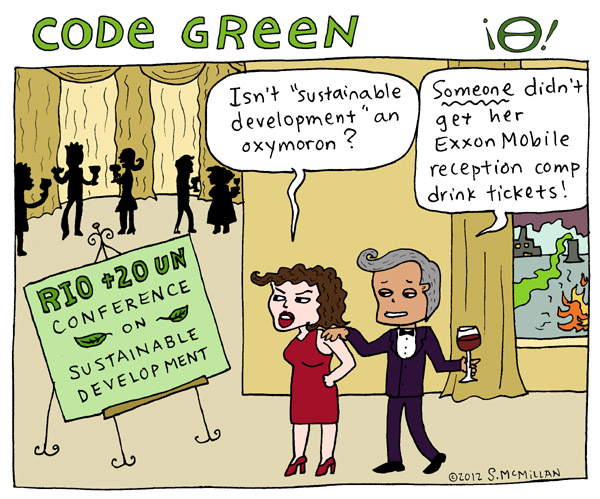
Over the past few weeks, SkS articles about the "politics" of climate change have generated more comments than article about the "science" of climate change. A case in point is Andy S's Scientific literacy and polarization on climate change. In this article, Andy discusses the findings of the paper, The polarizing impact of science literacy and numeracy on perceived climate change risks by Kahan et al published online by Nature Climate Change on May 27, 2012.

Source: Stephanie McMillan, Code Green.
“If decision-makers continue to focus mainly on economic growth to address the needs of humanity, rather than taking a range of factors into account in a more sustainable approach, they risk leaving future generations an even more polarised and dangerous world.” -- Archbishop Desmond Tutu, Chair of The Elders.
Source: Rio+20: Concrete Goals the Only Recipe for Success by Stephen Leahy, IPS News, June 16, 2012
What is your primary source of information about what's transpiring at the ogoing Rio+20 summit?
Aerosols: A collection of airborne solid or liquid particles, with a typical size between 0.01 and 10 μm that reside in the atmosphere for at least several hours. Aerosols may be of either natural or anthropogenic origin. Aerosols may infl uence climate in several ways: directly through scattering and absorbing radiation, and indirectly by acting as cloud condensation nuclei or modifying the optical properties and lifetime of clouds (see Indirect aerosol effect).
Source: Annex I (Glossary) to Climate Change 2007: Working Group I: The Physical Science Basis, IPCC Fourth Assessment Report.
A complete listing of the articles posted on SkS during the past week.
A list of articles that are in the SkS pipeline. Most of these articles, but not necessarily all, will be posted during the week.
Dana's Fred Singer Promotes Fossil Fuels through Myths and Misinformation was re-posted on Climate Progress.
The Alfred Wegener Institute carries out research in the Arctic and Antarctic as well as in the high and mid latitude oceans. The institute coordinates German polar research and makes available to national and international science important infrastructure, e.g. the research ice breaker “Polarstern” and research stations in the Arctic and Antarctic.
Posted by John Hartz on Monday, 18 June, 2012
 |
The Skeptical Science website by Skeptical Science is licensed under a Creative Commons Attribution 3.0 Unported License. |